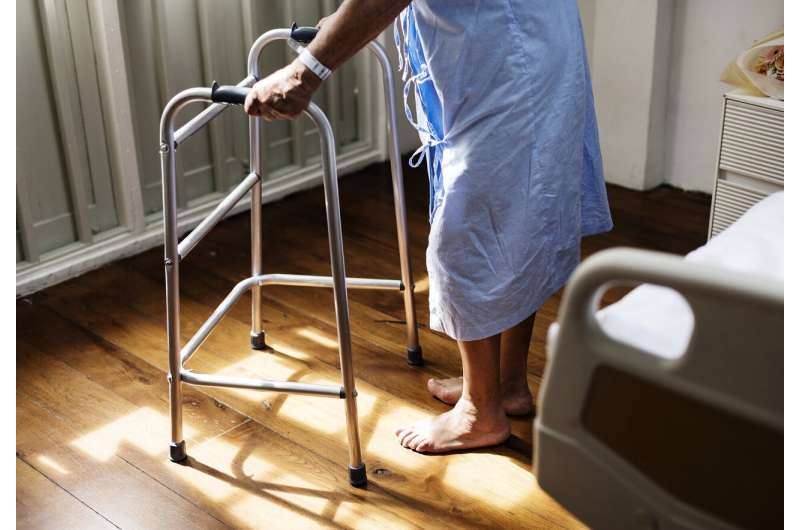This article has been reviewed according to Science X's editorial process and policies. Editors have highlighted the following attributes while ensuring the content's credibility:
fact-checked
peer-reviewed publication
trusted source
proofread
New test predicts risk of cognitive dysfunction in older surgery patients

Identifying an older patient who is at risk for post-operative cognitive dysfunction might be done in the blink of an eye—literally.
Researchers at Duke Health found that a simple EEG measurement detects a signal of cognitive vulnerability when patients are asked to close, then open their eyes. Conducted prior to surgery, the non-invasive readout of brain waves helps predict which patients are at risk of post-operative confusion and attention problems.
"Roughly half of seemingly normal older adults experience problems with thinking, memory or attention after surgery," said Leah Acker, M.D., Ph.D., assistant professor in Duke's Department of Anesthesiology and lead author of a study appearingin the British Journal of Anaesthesia.
"While the exact cause of cognitive dysfunction after surgery is unclear, the biggest predictor of impairment after surgery is pre-existing cognitive impairment," Acker said. "Pre-existing impairment can be difficult to detect with traditional screening tests, though, because many older adults compensate for minor impairments, particularly if they have more education, better support systems, or higher socioeconomic status."
Acker and colleagues said typical cognitive screening tests measure functions such as language skills, short-term recall and time-place orientation. Many people can compensate for these deficits, however, which masks their vulnerability to a common complication arising after surgery.
"When people are unaware that they have some cognitive dysfunction, the onset after surgery can be devastating," Acker said.
The Duke team used an EEG test to measure a change in brain electrical patters that cannot be disguised.
"Our test measures brain reactivity, which is a kind of automatic response. With something that is automatic, there is really no way to compensate," Acker said.
When people close and then open their eyes, their brains change specific electrical activity patterns called alpha oscillations. The decrease in alpha oscillations going from closed to open eyes is called alpha attenuation.
Specifically, EEG-measured alpha power is lower when our eyes are open and we are processing the visual information around us. Alpha power is higher when we are internally focused or daydreaming. This alpha-power decrease in the eyes-open vs. eyes-closed states remains strong in healthy older adults, but has been reported to be diminished among those with chronic neurocognitive disorders.
The Duke team harnessed this observation to devise a predictive test using a quick, preoperative EEG. They assessed 71 patients with a simple eyes-closed, eyes-open task to identify disordered arousal or attention. Patients were all over the age of 60 and were not undergoing neurological or cardiac procedures.
The researchers found that the test not only successfully detected which patients would have postoperative inattention, but it also helped identify the degree to which they'd experience problems.
While it remains unclear what causes an exacerbation of cognitive impairments in older patients after surgery and anesthesia, identifying patients who are at risk could help them weigh the impact of a procedure, and prepare them for the potential complication.
"This test is quite simple to perform and could prepare clinicians to take precautionary measures to reduce the risk for postoperative inattention, and possibly delirium," Acker said. "More generally, because the brain's reaction to something as simple as opening one's eyes is closely associated with specific attention functions, we expect that this may yield insights into the neural mechanisms underlying neurocognitive vulnerability and resilience."
More information: Leah Acker et al, Preoperative electroencephalographic alpha-power changes with eyes opening are associated with postoperative attention impairment and inattention-related delirium severity, British Journal of Anaesthesia (2023). DOI: 10.1016/j.bja.2023.10.037



















